In an exclusive interview with Voice of America's Uzbek Service, Under Secretary of State for Political Affairs Thomas Shannon says that peace and reconciliation in Afghanistan are crucial for the future of South and Central Asia. As the US representative to the recent Tashkent conference on the future of Afghanistan, Shannon argues that governments in the region well understand this. The challenge now, then, is less how to fight the war than how to end it in an enduring way. Washington views Uzbekistan as an emerging leader in pushing for a peace deal in Afghanistan. President Shavkat Mirziyoyev's actions, Shannon says, are "radiating very positively.” And Washington is determined to support reforms in Uzbekistan too. Below is the full video and transcript of the interview.
Navbahor Imamova, VOA Uzbek: It's wonderful to have you talking to us on a Friday afternoon.
Under Secretary Thomas Shannon: Thank you!
Navbahor Imamova, VOA Uzbek: We know that you have been spending time in Central Asia. We hear that you like going to the region-
Under Secretary Thomas Shannon: I do very much.
For us, what was interesting and useful about Tashkent is that it took the purpose of President Ghani and it took a process that began in Kabul, it brought it to Tashkent and then it internationalized it.
Navbahor Imamova, VOA Uzbek: ... and your most recent trip was to Uzbekistan where you led a delegation at the Tashkent Afghanistan Conference. So, Tashkent Conference has emerged as yet another platform to discuss the future of Afghanistan, but there are other platforms too. So, how is this different than others?
Under Secretary Thomas Shannon: The important thing about the Tashkent Conference is that it's linked to the Kabul Process and especially to the offer made by President Ghani to the Taliban to sit at the peace table in Afghanistan and construct a reconciliation process between Afghans, between brothers and sisters. For us, what was interesting and useful about Tashkent is that it took the purpose of President Ghani and it took a process that began in Kabul, it brought it to Tashkent and then it internationalized it. And because of the vast number of countries that participated, I think it sent a very strong message to the Taliban that the only way out is through negotiations and that the international community wants to see a successful reconciliation process.
Navbahor Imamova, VOA Uzbek: But is the international community on the same page when it comes to Afghanistan because we had so many representatives from so many different parts of the world with divergent interests?
Under Secretary Thomas Shannon: Yeah, it's a great question. Many countries especially Afghanistan's neighbors have different interests in Afghanistan, but I think all the participants understood the importance of peace in Afghanistan. All understand the importance of creating a reconciliation process in which these different countries can a play role, different kinds of roles depending on their interests and on their influence.
But I think that what we're really focused on here, and I think in some ways the government of Uzbekistan needs to be congratulated in this, is the way in which they had tried to democratize this process, and use the interest of many different countries to drive both sides to the negotiating table. And convince them that they really need to begin a reconciliation process that will be not just for the greater good of Afghanistan, but by creating a degree of stability and peace and then prosperity, open opportunities for other countries to benefit from that, but especially to address our security concerns.
Navbahor Imamova, VOA Uzbek: So, do you think countries like Pakistan, Russia, China, India, Afghanistan and five countries of Central Asia are going to be able to work together on this because to say that we want to work together is very easy.
Under Secretary Thomas Shannon: Of course.
Navbahor Imamova, VOA Uzbek: There are so many different tensions between these countries.
... we need to take countries at their word until they show us otherwise a reason not to take them at their word.
Under Secretary Thomas Shannon: And this is the challenge of diplomacy. It's the challenge that we face. It's the challenge that the Uzbek government and the other Central Asian countries face. It's an Uzbek hosting event and in many ways an Uzbek conceived event, but it had broad support from all of the Central Asian countries because the Central Asian countries recognize that they sit on top of Afghanistan and what happens in Afghanistan has a big impact.
I think that first of all, we need to take countries at their word until they show us otherwise a reason not to take them at their word. But also, many of the differences that have emerged between countries around Afghanistan have really emerged around how you fight the war. Now, it's really time to call people to the peace table and say, "This is where we need solidarity with the people of Afghanistan, with the government of Afghanistan, and this is where the international community can play a meaningful role."
Navbahor Imamova, VOA Uzbek: So, what is next now following the Tashkent Conference? We know that everybody came out with a memorandum on how to proceed forward, but what are the steps that are being expected to be taken?
Under Secretary Thomas Shannon: We're in the process of consulting with our partners right now about this, obviously, with our Central Asian partners, especially with our Uzbek partners. But also broadly speaking, during the conference itself, we had an opportunity to have extended discussions with some of our more important partners in the region. So, we're looking at what the next steps could be and should be.
Navbahor Imamova, VOA Uzbek: How do you feel about the security in Pakistan specifically because apparently the Trump administration has notified the Pakistani government that your diplomats will not or are not allowed to travel more than 40 kilometers from their posts. Is that true?
Under Secretary Thomas Shannon: Our diplomats are under travel restrictions. They can travel further, but they have to notify the government of Pakistan. It's very common in diplomacy, but what's important here, what's important to note and underscore is that we've had some very fruitful conversations with the government of Pakistan about events inside of Afghanistan. It's my hope that we're going to be able to build off those in a way that helps this broader reconciliation process.
Navbahor Imamova, VOA Uzbek: Is the U.S. government going to restrict the movement or the travels of the Pakistani diplomats here in Washington?
Under Secretary Thomas Shannon: Typically, these kinds of restrictions are reciprocal in nature, so I'll just leave it at that.
Navbahor Imamova, VOA Uzbek: Uzbekistan… You have met President Shavkat Mirziyoyev a few times now. What kind of a leader is he in your eyes?
Under Secretary Thomas Shannon: I think he has done remarkable things in a very short period of time. He has opened Uzbekistan to engagement with its neighbors in a remarkable way, and a way that I think has radiated very positively in the region. The Afghan conference is another example of how he is able to take what he has accomplished regionally and internationalize it in a really interesting fashion.
[Mirziyoyev] has done remarkable things in a very short period of time.
We've also found him to be very open to engaging with us broadly on the strategic nature of our partnership and to explore how we can enhance the relationship. So, from my point of view, he's proven to be an excellent partner.
Navbahor Imamova, VOA Uzbek: There is almost unlimited demand for assistance and support in Uzbekistan's reform process. I know that you have held some wide-ranging discussions with Uzbek officials. You're a very experienced diplomat. You know what America has done to promote reforms around the world over the years. What does the United States do well and doesn't do well when it comes to supporting reforms or such processes?
Under Secretary Thomas Shannon: That's a great question. To begin with, our reform efforts have the greatest impact when we have a partner to work with, when we have a partner that understands the importance of the reforms and is prepared to take the steps necessary to begin the reform process. Where we are sometimes challenged is understanding the importance of patience and understanding the importance of consistency.
In other words, if we're beginning a reform process, we have to create a reform process that can be politically sustainable over time and that we can build off of overtime. In other words, that allows us to consolidate each step along the way. This requires us to recognize that these processes take time especially for countries, Central Asia is a perfect example. These are deep civilizations and deep cultures that have very, very long histories but as countries, as political entities, they have fairly new histories.
The histories have involved both Soviet domination and then independence with all of the challenges that independence presents and now they find themselves in a part of the world reigned by significant security problems. So, as we engage, we have to understand the context in which we're working, but it's all about picking the right partner.
Navbahor Imamova, VOA Uzbek: So, you see Mirziyoyev as a willing partner, open partner to work closely?
I think what has emerged, at least in my visits to Uzbekistan and then my engagement with the government, is a willingness to engage with us in a very direct and open way.
Under Secretary Thomas Shannon: He's been a good partner for us. I mean, obviously, this is a process and the Uzbeks are evaluating us as we evaluate them. But I think what has emerged, at least in my visits to Uzbekistan and then my engagement with the government, is a willingness to engage with us in a very direct and open way.
A clear understanding on the part of the Uzbek government and the president and the foreign ministry of what it is we're looking and the recognition that the extent to which the government Uzbekistan can continue this reform process that enhances its ability to have a deeper relationship with United States, but also a deeper relationship with other important partners especially in Europe and in Asia.
Navbahor Imamova, VOA Uzbek: Where does Central Asia fit in America's foreign policy priorities now?
Under Secretary Thomas Shannon: Well, I mean its important part of the world. It's a part of the world that is trying to define itself and ensure that it doesn't get dragged once again into the great game, into power politics.
Navbahor Imamova, VOA Uzbek: Which is something that Washington has always said “we're not playing.”
Under Secretary Thomas Shannon: Exactly, and our purpose through our different efforts in the region especially in the C5+1 initiative is to give the countries of Central Asia a partnership option outside of their immediate region and outside of their immediate neighbors so that they have some degree of leverage to establish some independence.
We recognize that like any part of the world and any country, the countries of Central Asia have histories. They have neighbors that are not going away and that they have to find ways to build relationships with those neighbors. But as we do so, we want to make sure that they understand that they have a meaningful and reliable partner outside of their region that will help them globalize in ways that benefit their populations.
Navbahor Imamova, VOA Uzbek: When you talk to the Central Asian officials, do you hear or sense a vision for themselves, let's say, for the next 10-15 years because we know that Washington thinks that way. You strategize that way. You want to look that far, but do you think that the leaders in the region have that kind of a vision about themselves?
Under Secretary Thomas Shannon: It is being built now and it's being built through the engagements that we're seeing in the region because the C5 now meets on its own. So, they're having these larger discussions. Obviously, each of the Central Asian countries is different. They each have their own immediate concerns and that has to be respected and understood, but there are areas of commonality, border management, water management, movement of goods, services, and peoples, Afghanistan and what that means for security in the region and the broader security concerns that they face.
Because of this, I think we are seeing, especially because of the new openness in Uzbekistan and how its engaging with the Central Asian countries, we're seeing a more extensive kind of strategic thinking being done by the regional governments.
Navbahor Imamova, VOA Uzbek: And where do you see the region yourself in 10-15 years? What would you like to see?
I think we are seeing, especially because of the new openness in Uzbekistan and how its engaging with the Central Asian countries, we're seeing a more extensive kind of strategic thinking being done by the regional governments.
Under Secretary Thomas Shannon: So much will depend on the decisions that are made, number one. So much will depend on what happens in Afghanistan. So much will also depend on the kinds of relationships that we are able to build among the different countries that impact immediately on Central Asia-
Navbahor Imamova, VOA Uzbek: Like Russia and China.
Under Secretary Thomas Shannon: ... Russia, China, India, Pakistan, Iran, Turkey. But speaking for myself and what I kind of perceive coming from my different trips to the region and my engagement with leaders and foreign ministries and foreign ministers is we'd very much like to see a region that is not a crash pad between great powers, but is a facilitator of the movement of trade of goods and services in a region that is going to become very important economically. And which sits right above the larger Indian Ocean rim, which is going to be one of the most important strategic areas of either cooperation or competition in the 21st century because of the goods and services and the oil and gas that moves through this region.
And a grouping of Central Asian countries that are at peace with their neighbors, that they have built meaningful relationships in the region and among each other. But also have been able to, through outreach into Europe, into North America, into Asia and beyond, have become meaningful markets for other parts of the world, meaningful points of investment. But we're also able to act as connectors between the different regions of the world that surround Central Asia.
Navbahor Imamova, VOA Uzbek: We hear a very similar vision from some of the Central Asian leaders too, by the way.
Under Secretary Thomas Shannon: Yeah.
Navbahor Imamova, VOA Uzbek: Based on your conversations again in the region, what are some of your main concerns about the region right now across the region, let's say in any country?
Under Secretary Thomas Shannon: Well, first the security concerns in these countries are real. Up to this point, they've done a pretty good job of managing the threat posed by violent extremism and obviously, the emergence of organizations like ISIS Khorasan in Afghanistan are very worrisome. This obviously is one of the reasons we're focused reconciliation and peace process because as long as Afghanistan finds itself in the kind of internal conflict it faces, it creates space for groups like ISIS Khorasan.
Well, first the security concerns in these countries are real.
We believe that although we will continue to fight ISIS Khorasan, and recently we had some successes in terms of targeting leadership that has been very important. But if we can create an Afghanistan that's at peace, it's going to be much easier or turn Afghanistan into an exploiter of security for the region and not an exploiter of insecurity. So, that I think is going to be important and how the kinds of security decisions that are made.
Also, the continuing consolidation of democratic gains is going to be important. That means the continuing consolidation of gains in human rights, in labor rights and in the political opening of the societies. Again, our purpose is to promote sustainable change and change that can be consolidated over time, but we're going to be very clear about what partnership with us means when it comes to democracy and human rights.
Navbahor Imamova, VOA Uzbek: What can we expect from the U.S. as assistance now because we know that the assistance money has been going down. There hasn't really been a lot of money allocated to help these countries. So-
I think there is a clear recognition that Central Asia is important and that we need to find ways to have a presence in Central Asia and to be a meaningful partner in all aspects of the journey that these countries will be taking over the next several decades.
Under Secretary Thomas Shannon: Well, I mean actually there has been especially on the security side, but there's more we can do and there's more we should. This is a larger debate that we will see here in Washington especially in our Congress because our Congress is showing that it is going to play an increasingly assertive role in determining not just how we spend our money but the size of our budgets.
I think there is a clear recognition that Central Asia is important and that we need to find ways to have a presence in Central Asia and to be a meaningful partner in all aspects of the journey that these countries will be taking over the next several decades.
Navbahor Imamova, VOA Uzbek: You mentioned Afghanistan being the source of concern for Central Asians. Pakistan is also mentioned as a source of concern. As you know many Uzbek militants for a long time were based in Pakistan. We still hear from security officials that there are remnants of those in Pakistan. How can Central Asia work with Pakistan as much as it is trying to work with Afghanistan now and what could you do to help that process?
... it will be much easier to work with Pakistan in attempting to fashion peace in Afghanistan as opposed to trying to fashion a way to fight the war.
Under Secretary Thomas Shannon: Well, I'm not sure how much we can help that process because this is really something that the Pakistanis have to understand what the Central Asian countries, what their concerns are and what it is the Central Asian countries are trying to accomplish. But I'll go back to a point I made earlier which is, it will be much easier to work with Pakistan in attempting to fashion peace in Afghanistan as opposed to trying to fashion a way to fight the war.
It's my hope that we start a larger reconciliation process that Pakistan can play a meaningful and important role in that process. If so, it will open, I believe, the possibilities for deeper conversations especially with neighbors and especially with the Central Asian countries.
Navbahor Imamova, VOA Uzbek: What we have heard from the officials in the region is that “we have good bilateral relations with Pakistan, but when it comes to the security issues, when it comes to counter terrorism, fighting extremism, we need bigger partners to deal with.”
Under Secretary Thomas Shannon: Well, that is-
Navbahor Imamova, VOA Uzbek: In a way, they're counting on your pressure on Pakistan.
Under Secretary Thomas Shannon: No, I understand, but we're not the only big partner. China is a very important partner and especially for Pakistan.
Navbahor Imamova, VOA Uzbek: How about Russia?
Under Secretary Thomas Shannon: Russia, it's not as bigger partner as China is for Pakistan. Russia is historical on the region is conflicted, but we're very prepared, and we'll be very happy to have a larger conversation with Russia about this also.
Navbahor Imamova, VOA Uzbek: And Russia has become more active with and in Afghanistan as you know. As you also concerned about that or how do you see that change?
Russia is historical on the region is conflicted, but we're very prepared, and we'll be very happy to have a larger conversation with Russia about this also.
Under Secretary Thomas Shannon: It depends what they're doing. I mean if their purpose is to help build a successful reconciliation process, then they're welcome.
Navbahor Imamova, VOA Uzbek: Thank you so much.
Under Secretary Thomas Shannon: Thank you very much!





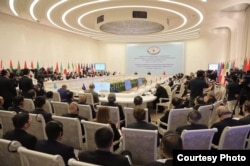
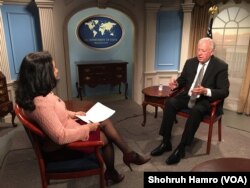
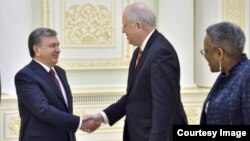
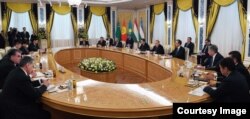
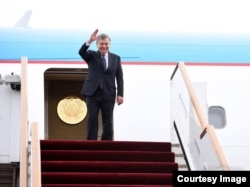
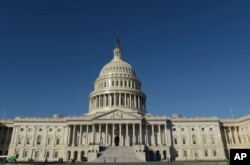
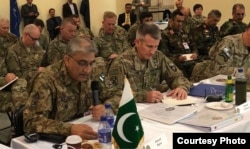


Facebook Forum